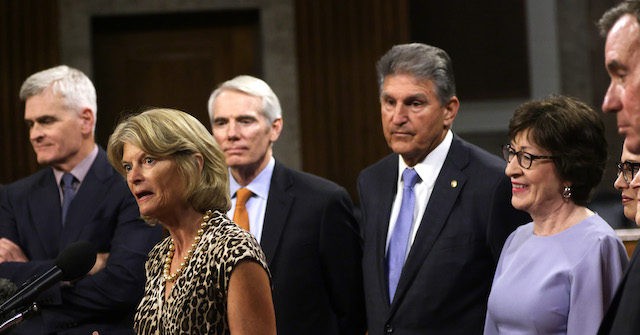
The $3.5 trillion spending plan resolution Democrats released Monday shows the link in between the so-called bipartisan and the Democrat infrastructure bill.
Democrats unveiled their massive “infrastructure” expense that would act as a significant expansion of the federal government and develop new taxes and federal government programs.
Lots Of Senate Republicans have actually attacked the Democrats’ multi-trillion-dollar facilities bill although they support the $1.2 trillion so-called bipartisan infrastructure.
Sen. Rob Portman (R-OH), one of the leading supporters of the bipartisan expense, has firmly insisted that the 2 bills are not connected and that GOP assistance for the bipartisan expense would not result in the passage of the even larger facilities costs.
Sen. Expense Cassidy (R-LA), another bipartisan advocate, stated the bipartisan bill is “totally different” from the partisan expense.
“They’re not connected, it is going to increase our financial obligation or else boost taxes, however in regards to our effort it shouldn’t have an impact,” Cassidy added.
Nevertheless, the text of the budget plan resolution notes that two facilities expenses are inherently connected.
Section 4,010 of the budget resolution, which works as the legal car for the Democrats’ reconciliation expense, enables House Budget plan Committee Chairman John Yarmuth (D-KY) to make changes to the bipartisan expense as he chooses.
The section reads:
In the House of Representatives, the chair of the Committee on the Spending plan might adjust the allotments, ag- gregates, and other monetary levels included in this con- current resolution to reflect modifications arising from the en- actment of a facilities expense or joint resolution, in- cluding legislation implementing the INVEST in America Act or a bipartisan infrastructure agreement.
This would appear to prove Senate conservative’s arguments that backing the bipartisan costs would only allow and advance the partisan infrastructure expense.
Eighteen Senate Republicans appear poised to pass the bipartisan expense and grant President Joe Biden a substantial legal victory.
The 18 Senate Republicans who voted Sunday to advance the so-called infrastructure supposedly include:
- Roy Blunt (R-MO)
- Richard Burr (R-NC)
- Bill Cassidy (R-LA)
- Shelley Moore Capito (R-WV)
- Susan Collins (R-ME)
- Kevin Cramer (R-ND)
- John Hoeven (R-ND)
- Mitch McConnell (R-KY)
- Lisa Murkowski (R-AK)
- Rob Portman (R-OH)
- Jim Risch (R-ID)
- Mitt Romney (R-UT)
- Thom Tillis (R-NC)
- Deb Fischer (R-NE)
- John Cornyn (R-TX)
- Roger Wicker (R-MS)
- Dan Sullivan (R-AK)
- Mike Crapo (R-ID)
Sens. Ron Johnson (R-WI), Rick Scott (R-FL), Marsha Blackburn (R-TN), Mike Braun (R-IN), Ted Cruz (R-TX), Josh Hawley (R-MO), and Mike Lee (R-UT) launched a joint statement in early August, competing the bipartisan infrastructure expense, or the Infrastructure Investment and Jobs Act works as only the beginning of the Democrats’ “liberal desire list.”
The Senate conservatives said:
We can’t spend money we don’t have. Duration. Simply look at what is happening with inflation. We were guaranteed this infrastructure expense was completely spent for, and now we see that it’s not. This was absolutely nothing more than a bait and switch. $205 billion of this costs was to be paid for with repurposed COVID funds. The current proposition only shows $50 billion in COVID funds being used, along with a great deal of the proposed ‘pay-fors’ missing. So we are asking our associates: How is this facilities costs being paid for? We still do not know. We still do not have a rating on this legislation from the Congressional Budget Workplace. Let’s not forget, this is just the primary step in the Democrats’ plan to pass their $5.5 trillion tax-and-spend liberal dream list.
They added, “We support infrastructure, but it has to be paid for. This proposal isn’t it.”
Sean Moran is a congressional reporter for Breitbart News. Follow him on Twitter @SeanMoran3.

